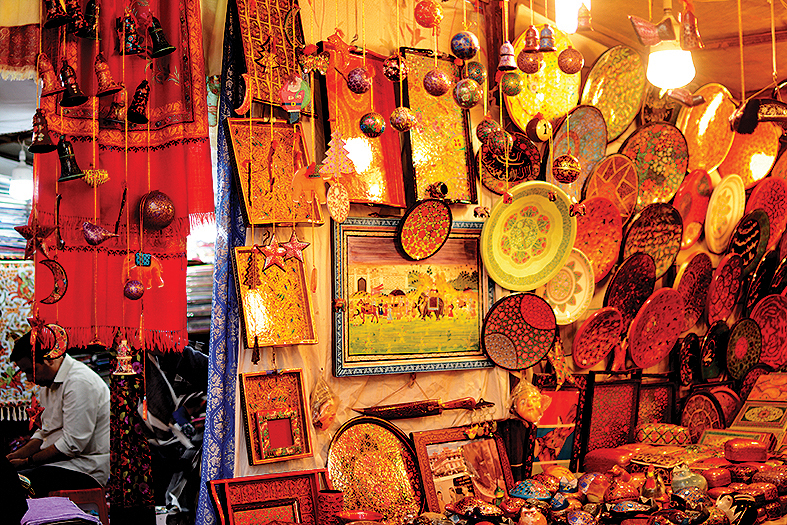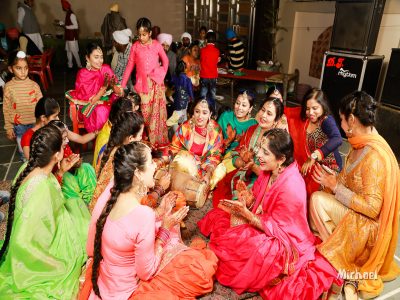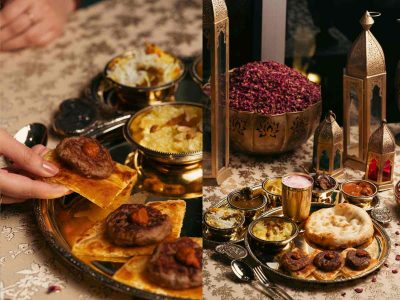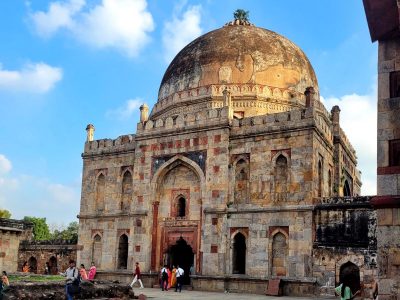For the past few weeks, Kashmiris have faced unprecedented backlash in the country. Patriot meets craftsmen in Delhi who try and continue their work amidst the cloud that hangs
As someone who has been to Kashmir as a young college student on an assignment to understand and document the lives of craftsmen there, I can safely say the people live up to its beauty.
Kashmir is one place that will mesmersize you. You will be invited for a cup of hot Kahwa at a craftsmen’s home, where you sit on the carpeted floor examining the details that go into weaving a Pashmina shawl and the intricate embroidery on it. They are open enough to demonstrate weaving a portion of a shawl on the loom kept in a small bedroom in their subtle abode.
Like many other Indian states, Kashmir is known for its crafts, like the hand-woven shawls, paper Mache containers, walnut wood carving or the hand knotted carpets that were introduced in the state by Persian and Iranian rulers some 600 years back.
To understand the current state of affairs and how these crafts have evolved in the last few years, especially after the recent events where Kashmiris have been subjected to societal and political tension, Patriot speaks to the state’s craftsmen at Delhi Haat about the turmoil that surrounds their lives.
After multiple craftsmen decided to dodge all questions, it was KM Bhat who was willing to answer every query about the embroideries on the woolen shawls in his shop. It is indeed his virtue of being a craftsman who also happens to be handling the business side of it, that encourages him to be patient with his customers. He explains the difference between Aari work and needle work, also how to identify the quality of work done by a master craftsman, also known as a Ustad.
USTTAD is also the name a recent project that Ministry of Minorities curated with the help of NIFT, that held workshops for young craftsmen to learn the skills it takes to be a master. The products that were designed through 15 clusters in India were exhibited for a week at Crafts Museum.
When requested, Bhat politely holds out his card and shares how their brand has won three national awards out of which one was won by him. “I worked on this really unique thing that I made for this award. It took me five years.”
His Urdu is on point and his Kashmiri accent only adds to it. He savors all his words. Like Hunar, Taleem or even how he says, “Pashmina.”
He speaks about his brother who has a shop in US. “He is there in Hawaii taking care of business abroad. He mostly lives there.”
There is a minimum amount of business he has to do every day to keep him afloat. Craft is a dicey business. There is nothing, if there is no market. “Many times our customers bargain. That does not help at all. It is hand made and very rarely a customer takes that into account,” adds Bhat as he starts folding back the shawls that he showed his customers.
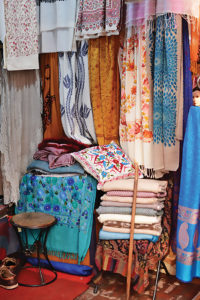
On sharing with him about a trip to Kashmir and the hospitable people who live there, he goes on to tell us how he thinks that Kashmiris are not thought of as nice people. With a certain sadness in his tone, he says, “Madam sab ek jaise nahi hote.”
Bhat who does business from New Delhi year-round, shows us the logo of his brand label, Bhat Brothers, that is embroidered on each product at his shop. Branding is still a rare concept in the crafts market but ‘BB’ has got all points covered, from hand embroidered logos to national awards, that help their business in turn.
Shefali Vasudev, who has extensively written about Indian fashion, arts and crafts recently posted a video on her Instagram account. In it she spoke of her displeasure, when not many designers responded to her with their take on how to include Kashmiri artisans in the mainstream fashion business. Eventually, many designers spoke their heart out for their belief in the Kashmiri arts and crafts.
From Shahab Durazi to Rajesh Pratap Singh, all voiced their thoughts on the treasures of Kashmir and how they look forward to contributing to the rich crafts from the place. Many designers who spoke for Vasudev’s campaign for Reliance’s Voice of India, are of the belief that arts must distract countrymen from all the negativity that surrounds the narrative of Kashmir.
At the extreme end of ones walk at Delhi Haat, there sits a shop with craft products made of paper Mache, brought to India by Mir Sayyed Ali Hamdani – a Sufi mystic from Iran – in the 15th century. Big and small models of elephants, ducks, ladybirds and many other faunas painted in lustrous colors decorate the entirety of this shop. Here sits Mohammed (name changed), a young man who explains how they work in Delhi for 7-8 months and spend the rest of the time in Kashmir getting the products made.
Watching cricket on his phone, with an ever-present smile he talks about his team of 15 craftsmen back in his hometown. “Delhi becomes too hot in summers, the shops here are a temporary and we can not exactly install air conditioning,” adds Mohammed. In their time, back in Kashmir, he pushes for export to countries like US, Germany and Japan, “Specially during Christmas, there is a huge scope,” he adds.
According to Mohammed, initiatives like Surajkund mela are appreciable, and while he exhibits his goods there, the location gets very dusty and destroys the craftwork in a single day. “Government should start something as big as Surajkund which is permanent,” suggests Mohammed as he thinks that’s one way to catch up with China. In his opinion, Indian craftsmen lose a lot of business because of the cheap crafts that China is able to produce.
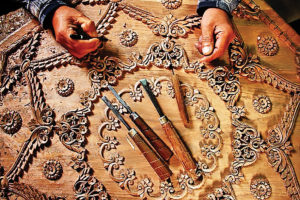
His father, an utterly disappointed man in his visibly calm composure has his own experience to share, in exchange of information that would add to his knowledge. He is an admirer of Arvind Kejriwal’s simplicity and calm nature. “Look at (Narendra) Modi, he is always making noise,” adds the old man who has been doing this business for the last 40 years.
He resents the introduction of GST, as “we are craftsmen and we don’t know how to keep these records.” He adds that, even for a small billing amount of Rs 10,000, they need a GST number. “Only the big businessmen are benefitted out of this”.
Speaking about the way people view every Kashmir, he calls it unfair, and hopes for things to get better. “Government does not care, all they want to do is protect their position. Obviously there is a lot of backlash we have to face for being Kashmiris. It adds on to our plight of being craftsmen when we are already dealing with so much.”
A foreign man in his 50s wearing his backpack and DSLR camera around his neck, stands at the next shop and is asked by another Kashmiri shopkeeper if he has visited Kashmir. The American man willingly shares how he is told that it is not safe as yet to visit the state, but hopes to do so soon. It is already his third trip to India, in the last two years.
The extreme end of Delhi Haat is full of Kashmiri crafts shop. Some will coax you and invite you to buy something from them. They are definitely more confident than other craftsmen from various states.
Desraj Mattoo, a Kashmiri Pandit who migrated to Jammu some ten years ago, sits at his stall of Pashmina Shawls. He is of the belief that only ten percent of people in Kashmir are serious about their work, rest just get carried away by what they see in the news. “We are one country and we must behave like one,” affirms Mattoo.

